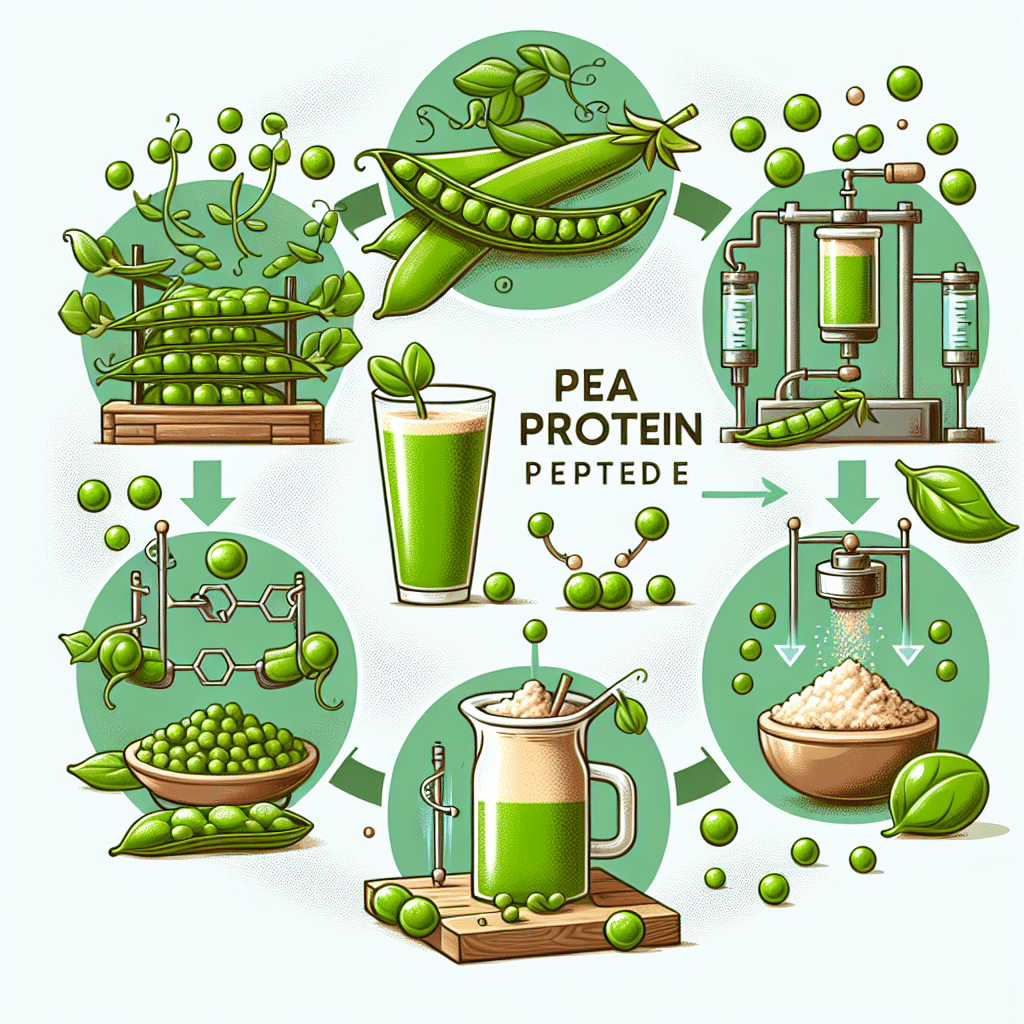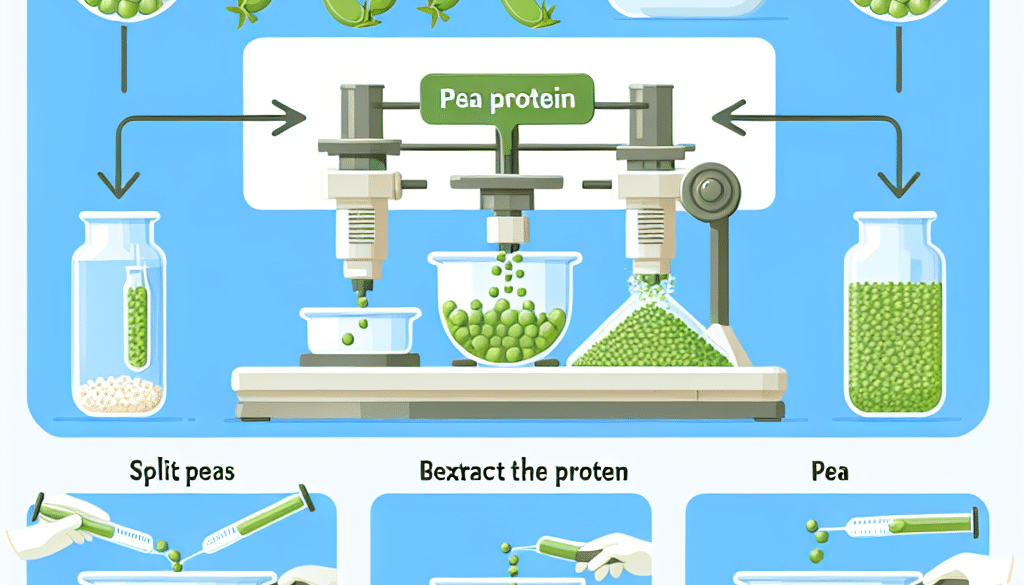What Is Pea Protein Peptide?
-
Table of Contents
- Pea Protein Peptide: A Comprehensive Guide
- Understanding Pea Protein Peptide
- The Nutritional Profile of Pea Protein Peptide
- Health Benefits of Pea Protein Peptide
- Applications of Pea Protein Peptide
- Pea Protein Peptide vs. Other Protein Sources
- Case Studies and Research
- Market Trends and Consumer Demand
- Conclusion: The Future of Pea Protein Peptide
- Discover ETprotein’s Premium Pea Protein Products
Pea Protein Peptide: A Comprehensive Guide

Pea protein peptide is emerging as a popular ingredient in the health and wellness industry, particularly among those seeking plant-based alternatives to animal-derived proteins. This article delves into what pea protein peptide is, its benefits, applications, and why it’s becoming a staple in dietary supplements and food products.
Understanding Pea Protein Peptide
Pea protein peptide is derived from the humble pea, a member of the legume family. It is created by breaking down the protein from yellow peas into smaller chains of amino acids, known as peptides, through a process called enzymatic hydrolysis. These peptides are easier for the body to absorb and utilize compared to whole proteins, making them an efficient source of nutrition.
The Nutritional Profile of Pea Protein Peptide
Pea protein peptides boast a rich nutritional profile, including a high content of essential amino acids. They are particularly abundant in branched-chain amino acids (BCAAs) like leucine, isoleucine, and valine, which are crucial for muscle protein synthesis. Additionally, pea protein peptides are:
- Rich in iron
- Free from common allergens such as gluten, lactose, and soy
- Low in fat and carbohydrates
- Cholesterol-free
- Environmentally sustainable
Health Benefits of Pea Protein Peptide
Pea protein peptides offer a range of health benefits, making them an attractive option for various dietary needs:
- Supports Muscle Growth: The high BCAA content aids in muscle building and recovery, making it a favorite among athletes and fitness enthusiasts.
- Weight Management: Its ability to promote satiety can help in weight management by reducing overall calorie intake.
- Heart Health: Studies suggest that pea protein may help lower high blood pressure and cholesterol levels, contributing to cardiovascular health.
- Hypoallergenic: Being naturally free from common allergens, pea protein peptides are suitable for individuals with food sensitivities.
- Easy Digestion: The hydrolyzed form of pea protein is easier to digest, reducing the likelihood of gastrointestinal discomfort.
Applications of Pea Protein Peptide
Pea protein peptides have a wide range of applications in the food and supplement industry:
- Dietary Supplements: They are commonly found in protein powders, bars, and ready-to-drink shakes.
- Functional Foods: Pea protein peptides can be incorporated into baked goods, meat substitutes, and dairy-free products.
- Sports Nutrition: Their muscle recovery properties make them ideal for pre- and post-workout supplements.
- Medical Nutrition: They are used in products designed for individuals with specific nutritional needs, such as the elderly or those recovering from illness.
Pea Protein Peptide vs. Other Protein Sources
When compared to other protein sources, pea protein peptides stand out for several reasons:
- Sustainability: Pea cultivation has a lower environmental impact than animal-based proteins and some plant proteins, requiring less water and land.
- Complete Protein: Unlike many plant proteins, pea protein contains all nine essential amino acids, though it is slightly lower in methionine.
- Non-GMO and Allergen-Free: Pea protein is often non-GMO and does not contain common allergens, making it widely acceptable.
Case Studies and Research
Several studies have highlighted the benefits of pea protein peptides. For instance, a 2015 study published in the Journal of the International Society of Sports Nutrition found that pea protein promoted muscle thickness gains just as effectively as dairy-based whey protein in athletes. Moreover, research indicates that pea protein may have beneficial effects on blood pressure and kidney health.
Market Trends and Consumer Demand
The global market for pea protein is on the rise, driven by increasing consumer demand for plant-based products and sustainable protein sources. According to a report by MarketsandMarkets, the pea protein market is projected to reach USD 1.4 billion by 2025, growing at a CAGR of 13.5% from 2020 to 2025.
Conclusion: The Future of Pea Protein Peptide
Pea protein peptide is more than just a trend; it’s a sustainable, nutritious, and versatile ingredient that caters to a growing demand for plant-based proteins. Its ease of digestion, hypoallergenic nature, and muscle-building capabilities make it a strong contender in the protein supplement market. As research continues to uncover its health benefits, pea protein peptide is poised to become a staple in diets worldwide.
Discover ETprotein’s Premium Pea Protein Products
If you’re looking to incorporate high-quality pea protein into your diet or product line, ETprotein offers a range of superior protein products. Their pea protein peptides are characterized by a neutral taste, non-GMO, and allergen-free attributes, ensuring that you receive the best in terms of both nutrition and flavor.
About ETprotein:
ETprotein, a reputable protein and L-(+)-Ergothioneine (EGT) Chinese factory manufacturer and supplier, is renowned for producing, stocking, exporting, and delivering the highest quality organic bulk vegan proteins and L-(+)-Ergothioneine. They include Organic rice protein, clear rice protein, pea protein, clear pea protein, watermelon seed protein, pumpkin seed protein, sunflower seed protein, mung bean protein, peanut protein, and L-(+)-Ergothioneine EGT Pharmaceutical grade, L-(+)-Ergothioneine EGT food grade, L-(+)-Ergothioneine EGT cosmetic grade, L-(+)-Ergothioneine EGT reference grade and L-(+)-Ergothioneine EGT standard. Their offerings, characterized by a neutral taste, non-GMO, allergen-free attributes, with L-(+)-Ergothioneine purity over 98%, 99%, cater to a diverse range of industries. They serve nutraceutical, pharmaceutical, cosmeceutical, veterinary, as well as food and beverage finished product distributors, traders, and manufacturers across Europe, USA, Canada, Australia, Thailand, Japan, Korea, Brazil, and Chile, among others.
ETprotein specialization includes exporting and delivering tailor-made protein powder and finished nutritional supplements. Their extensive product range covers sectors like Food and Beverage, Sports Nutrition, Weight Management, Dietary Supplements, Health and Wellness Products, and Infant Formula, ensuring comprehensive solutions to meet all your protein needs.
As a trusted company by leading global food and beverage brands and Fortune 500 companies, ETprotein reinforces China’s reputation in the global arena. For more information or to sample their products, please contact them and email sales(at)ETprotein.com today.












